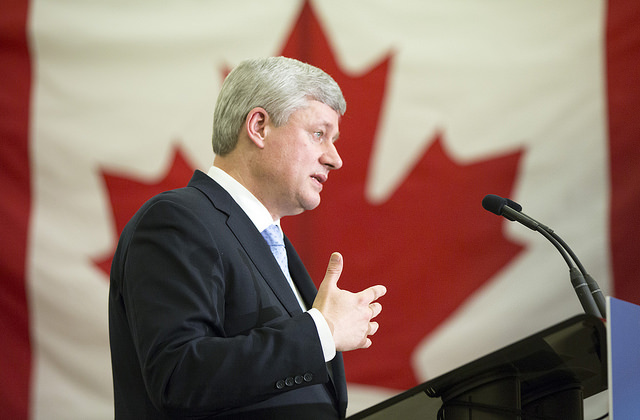Chip in to keep stories like these coming.
Mr. Harper and the Conservatives never miss an opportunity of reminding Canadians that we should vote for them in October in order to ensure economic prosperity in the future. At the heart of this argument is the belief that they are the best-equipped political party to manage the Canadian economy. Yet a new study arrives at the very opposite conclusion: Mr. Harper’s government has the worst economic record of all federal governments in Canada since 1946.
Since the beginning of the election, Mr. Harper has been busy reminding Canadians how his government is the one to be trusted when it comes to the economy, that his government delivered the goods. In painting the Liberal and NDP parties as dangerous alternatives, Mr. Harper proclaims himself as the best stalwart of the Canadian economy.
But economists Jim Stanford and Jordan Brennan disagree. In a very thorough paper, they have identified 16 variables (for instance unemployment, income inequality, real economic growth, household debt, private business investment, exports, real personal incomes among others), and compared the economic record of all governments since 1946 (with a few exceptions, like for instance the governments of Joe Clark, John Turner and Kim Campbell). After some serious number crunching (using data provided mostly by Statistics Canada) they conclude, not surprisingly, that Mr. Harper’s government arrives dead last, with Mr. Mulroney’s government a distant second.
On individual variables, Mr. Harper’s government ranks last on a great many of them, and second to last on some of the remaining ones. For instance, take exports. Mr. Harper is quite fond of pursuing trade agreements, so one would imagine that Canada would have benefited from these free trade deals by showing a spike in our exports. Yet, that is not the case. In fact, overall, exports have fallen during the Harper years.
The puzzling aspect in all this is how Mr. Harper can make such claims, when surely he and his staff are keenly aware of his government’s abysmal record. After all, one only needs to crunch numbers from Statistics Canada, or his own Ministry of Finance to arrive at the same conclusion. Mr. Harper, however, plays fast and loose with the statistics (he was never fond of statistics), and enjoys misquoting, misrepresenting and misleading.
This is a tactic straight out of the Ann Coulter book of politics: it’s not necessary to tell the truth as long as you say it with conviction. Eventually, voters may believe you.
One example that comes to mind happened during last week’s leaders debate where Mr. Harper argued that Canada’s recession was “almost exclusively” limited to the oil sector. According to Mr. Harper, the rest of the economy was growing and doing just fine. He then claimed that “80% of the Canadian economy is healthy and growing.” He has repeated that claim many times since.
Yet, nothing is further from the truth. In fact, the rest of the economy is not doing fine. The truth is that the Canadian economy is showing signs of severe stress: it’s called a recession. In fact, at this point, the oil crisis is playing a secondary role. The biggest contraction is not being felt in the energy sector, but rather in the manufacturing sector.
There were noticeable declines in three out of five goods-producing sectors, and the service industry was hit in 11 out of 15 sectors. It would therefore be more accurate to say that 80 per cent of the Canadian economy is sick and slowing down.
The economic weakness is broad and taking root. This is reflected in the disastrous employment numbers: while the economy created a measly 6,600 jobs, this hides the real numbers. More than 17,000 full time jobs were lost and replaced with part-time or precarious jobs. Labour force participation ticked downward again, and the number of unemployed individuals actually grew.
For the better part of a year, I have been writing on the economic record of this government. Mr. Harper’s policies of austerity have crippled the country, and we are now one of the worst performing economies of the G7, and in fact, our recovery since the 2007 crisis has been among the worse post-recession recoveries.
Mr. Harper is quite fond of saying that if we embark on a fiscal spending spree, we will end up like Greece. Such a statement reflects his complete misunderstanding of how economies actually work. Canada can never become another Greece; it is impossible. But if it could, if it ever were to happen, it would be through austerity, not through too much fiscal spending.
Louis-Philippe Rochon is associate professor of economics at Laurentian University and founding co-editor of the Review of Keynesian Economics. Follow him on Twitter @Lprochon
Photo: pmwebphotos/flickr
Chip in to keep stories like these coming.



